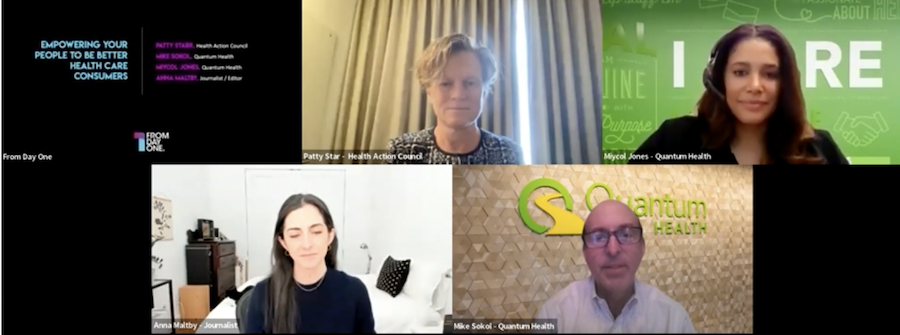Empowering Your People to Be Better Health Care Consumers


Offering your employees a health care benefit isn’t where the work ends—it’s where the work begins. When your team is healthy, they’re able to show up more powerfully both at work and for themselves.
“What we've learned over time is that your healthy employees actually are happier,” said Patty Starr, president and CEO of Health Action Council, a coalition of employers that works to secure more affordable and effective health care for employees. “And they're actually more productive. They're more able to deliver not only on their personal goals, but also their professional goals and the organization.”
”What we see as well is that often there's a big disconnect between what employers think and what their employees and family members think,” Dr. Mike Sokol and senior vice president for clinical strategy at Quantum Health, a health care navigation company for employers. Sokol pointed to an internal Quantum survey in which 88% HR professionals said their employees knew how to navigate their health care system, but only 35% of employees agreed.
“All of us can get into those times where we're extremely busy, there's a lot going on,” added Miycol Jones, senior director of employee experience and growth at Quantum Health. “It happens with our employees, and it happens with the HR professionals as well. Employers need to be really intentional about making the time to help provide those resources, because everybody's stretched.”
These leaders weighed in on how stakeholders can help their employees become more cost-effective health care consumers in From Day One’s webinar panel discussion titled “Empowering Employees to Be Better Health Care Consumers,” moderated by journalist Anna Maltby.
Employees Are Hungry for Health Care Solutions
Your workers not only want access to health care; they also want simple, straightforward instructions on how to utilize that health care effectively.
“You can provide your employees with a go-to resource for all things health care,” said Jones. “But honestly, a lot of times people just want to [be able to] call someone. They want to get a really quick answer. A navigation partner like Quantum can provide a single point of contact for members and providers.”

Starr agreed. “As employers, we sometimes forget the human side of things, and what's happening in somebody's life on a day-to-day basis that we might actually not know,” she said. “So there might be a whole bunch of chaos, things pulling them like Gumby in a whole bunch of different directions, but all we see is what’s happening in front of us on a day-to-day basis. There's sometimes a disconnect between what our employees need and want at that moment.”
When it comes to human resources leadership, part of being effective means knowing about the latest trends and changes in health care that can add value for your organization’s employees.
“We're seeing a number of interesting trends,” Sokol said. “One that we're seeing quite a bit now is an explosion of these “point solutions.” We have a number of vendors out there now that are focusing on one specific area, like diabetes reversal, weight loss, musculoskeletal conditions, or fertility management. There are probably hundreds if not thousands of these companies popping up all over the place. And what we're finding is that a number of large and medium and even small self-insured employers are starting to contract with the solutions, but in some cases, they may have multiple solutions in place.”
Sokol added that these layers of complexity are causing some companies to engage with marketplace navigation providers, who can track all the changes and ensure multiple plans aren’t contracted inadvertently.
Help Workers Improve Health Literacy, Equitably
Don’t underestimate the level of support your employees may need to grasp fundamental health insurance terms, added Sokol.
“Do they really understand the basic concepts of health insurance and the health care system?” he said. “If they don't, how can we really expect that they can take care of themselves? [health literacy] really is a very important topic.” Sokol cited one industry study in which only 4% of workers could correctly define the terms copay, coinsurance, deductible, and out-of-pocket maximum.
When it comes to health insurance, don’t be afraid to repeat your message often in order to help workers get comfortable with the benefits they earn and deserve each month.
“I definitely encourage teaching it all year long, all the time,” Starr said. “The number of people who don't know the basics today is overwhelming. Just keep on repeating it.”
Editor's note: From Day One thanks our partner, Quantum Health, for sponsoring this webinar.
Nick Wolny is an editor, journalist, and consultant. Currently a senior editor at CNET, he has previously written for Fast Company, Fortune, Business Insider, and OUT Magazine, and is a frequent television commentator on technology and work life. He is based in Los Angeles.
The From Day One Newsletter is a monthly roundup of articles, features, and editorials on innovative ways for companies to forge stronger relationships with their employees, customers, and communities.